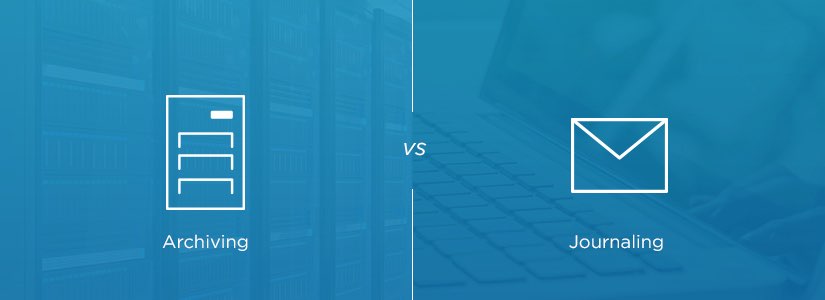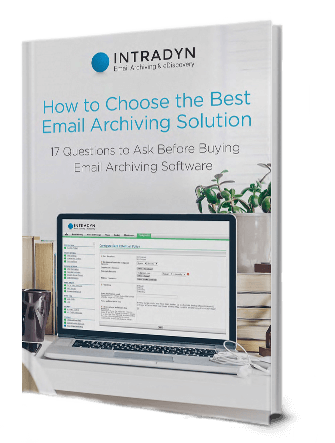Email Archiving vs. Email Journaling: Understanding How Both Processes Can Help Your Business

There are seemingly endless reasons why organizations need to retain their electronic communications and information. An overwhelming amount of opinions are available across the internet, explaining the ever-expanding role that email and social media interactions have in our daily lives. The argument of whether retaining and maintaining this data is necessary is no longer relevant; it has become a regulatory priority requiring astute adherence to retention policies, as well as a thorough understanding of the electronic storage process. Being aware of this process can determine whether an organization is adequately prepared to meet compliance standards.
A crucial part of reaching that understanding is grasping the difference between what happens with an email during the process of journaling a message to a mailbox, and the process of archiving and permanently storing your email and social media information using a third-party solution provider. While it might appear from an outside perspective that these are two sides of the same coin, they are in fact different procedures, which can have very different impacts on your day-to-day business practice.
What is Email Journaling
Email Journaling is defined as the ability to record all communications for use in the organization’s email retention or archival strategy. It is considered a means of recording the user’s message, providing a tool for easy retention policies. To meet stringent regulatory and compliance requirements, organizations must maintain records of communications that occur when employees perform daily business tasks.
A journaling system will create a copy of each individual communication and store it in its own separate mailbox, continuously stockpiling historically stored information. Over time, this creates a logjam in your journaled mailboxes as everything gets copied and stored for an indefinite amount of time. Depending on the amount of meta data within a communication (attachments, graphics, etc.), this will cause your servers to become bogged down with duplicate material, resulting in significant setbacks in the overall performance of the system.
Most email journaling services offer a combination of blanket journaling options, which enable the journaling of all messages to and from all mailboxes located on a server, and granular options which allow the scope to be narrowed to specific departments, elements, or people. This can leave significant loopholes within your retention policy, and result in the information necessary for requests falling through the proverbial cracks.
What is Email Archiving
While email journaling refers to the copying of messages as means of electronically maintaining compliance, the archiving of electronically stored information refers specifically to the ability to completely move a message from one data store to another.
An individual and independent archiving solution is considered the best way to maintain compliance in regulatory industries. This is because an archiving solution stores emails in the most protected manner, moving and securing only one copy of the email or social media interaction, immediately after it has been sent or received. This allows your organization to collect, secure, and store extremely large amounts of email in a central location, which can be easily searched for eDiscovery or audited to demonstrate corporate compliance. Most importantly, the archiving solution maintains the data in a fashion which cannot be altered or deleted, guided by the parameters of your organizational retention policy. This guarantees that your organization can present any necessary information should you be faced with litigation or open records requests.

Why Archive
Why is Archiving a Better Practice?
As previously mentioned, the information copied in an email journaling solution will continue to build up, until the journal mailbox is full. Once that occurs, most solutions are designed to store the information in PST files, which are accessible and corruptible by outside forces. The copies of your information also can increase the odds that the archived information is tampered with or altered, which can cause irreparable damage to business and personal reputations. While the use of email journaling is meant to increase the ease with which your organization remains compliant, the double storage of all your data leaves you vulnerable to the sorts of situations it is designed to prevent.
Whereas journaling electronic communications creates multiple copies of the same data, archived messages are stored using “single instance” formatting. This means that only one copy of a message will be stored, even if it was sent or received across multiple accounts. Essentially, the information is sent immediately to a lock box, where it stays safely until it needs to be recalled, whether for legal purposes or otherwise. Additionally, the meta data within the message will not be duplicated again, no matter how many more times the information is passed along through other accounts.
Finding a solution which stores your data is not a hard task to accomplish; as indicated, there are more solutions available than one can readily count. At Intradyn, we are confident that we present the most comprehensive solutions, in large part because we were the original and first of our kind, and have been establishing the market’s precedents since our inception in 2002.
Our state-of-the-art email archiving solution can reduce the storage costs and stress on your servers and the associated expense for email back-ups. It will allow you to instantly access enormous volumes of emails and electronic documents for eDiscovery regulations, providing you with quick recovery, high performance and trouble-free searches. The installation process will take only minutes, but it is guaranteed to keep your organization in compliance with applicable regulations for years to come. Contact us today to learn more.

